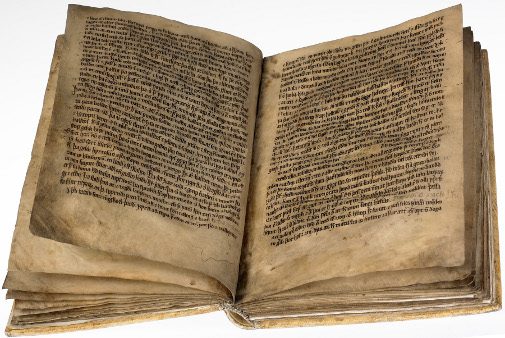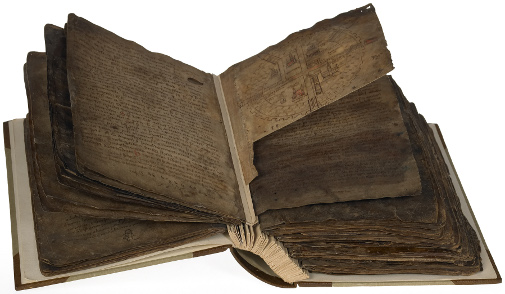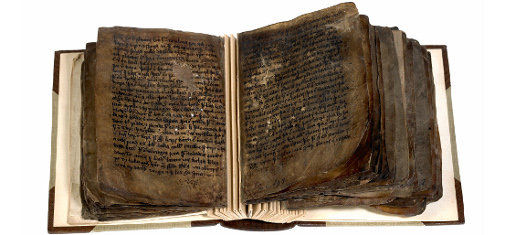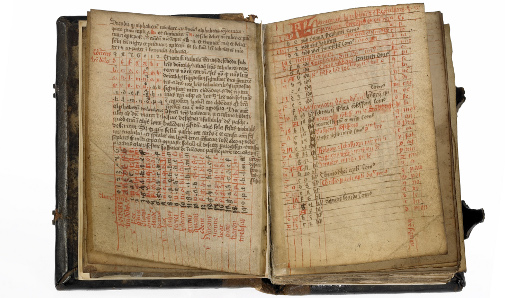Learned manuscripts
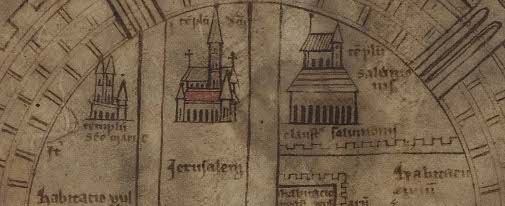
There is a wide variety of manuscripts which preserve learned works, such as encyclopedic literature and leech books.
Encyclopedic literature
In medieval times, national encyclopedias providing information on a wide array of topics did not exist. There were many individual works, however, either translations of Latin texts or works in the vernacular, which had a popular informative or didactic goal. Lucidarius (the Enlightener) gives a biblical historical and cosmographic recount of the creation of the world along with explanations of masses aimed at a wider audience. The King's Mirror (Speculum regale/Konungs skuggsjá) contains wisdom on how to educate kings and princes, among other things on warfare and the ability to do business. Both works are written as dialogues between teacher/father and pupil/son.
AM 242 fol., Codex Wormianus, a primer from the middle of the 14th century
AM 242 fol., also known as Codex Wormianus after its earlier owner, the physician and runologist Ole Worm (1558-1654), is dated to ca. 1350. It contains didactic texts on Nordic mythology, the art of poetry and grammar, and other texts. The manuscript also contains Snorra Edda, i.e. a primer on the art of poetry with Nordic mythology as its main topic, and four grammatical treatises on the Icelandic language. On page 90, the first proposal for a standardised Icelandic alphabet with its possible variants and abbreviations is presented. Click on the picture to leaf through the manuscript AM 242 fol.
The contents of the manuscript are roughly presented here along with links to the corresponding pages in the manuscript:
- Snorra Edda (pp. 2-82 and 121-136)
- The four grammatical treatises (pp. 83-119)
- The list of verse types from Háttatal (the missing text has been added on paper leaves by priest Sveinn Jónsson in the 17th century) (pp. 136-152)
AM 544 4to. Hauksbók
AM 544 4to, also known as 'Hauksbók', is a miscellany that, on top of the various sagas it contains, also contains many informative texts. The first 38 pages consist of various texts on geography (see for example this map of Jerusalem on f. 19v), history, physics and theology. Click on the picture to turn the pages in the manuscript AM 544 4to.
AM 1056 4to
The manuscript contains various text pieces from, among others, juridical or religious texts. The ninth fragment in the manuscript contains two folia with the text of the Norwegian King's Mirror (Konungs skuggsjá) from the 14th century, which is an educational dialogue between a teacher and his pupil on how a prince ought to behave and what knowledge he ought to have.
AM 76 8vo. Lucidarius from the 16th century
AM 76 8vo from around 1470 contains, among other texts, the Lucidarius in Old Danish, a medieval encyclopedia presented as a dialogue, the Gospel of Pseudo-Matthew and psalms and songs in Danish and Latin accompanied by musical notes.
AM 194 8vo
This manuscript from the 15th century contains texts on geography, history and medicine. The first chapter contains a travel map to the Holy Land along with a description of paradise, while the last chapters narrate the origin of the world and Hypocrates' medical advice.
Leechbooks
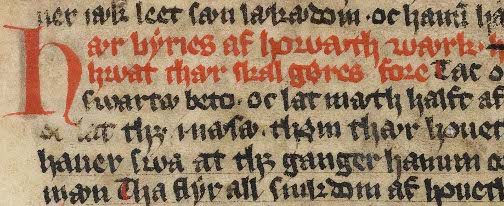
The title of a chapter with medical advice against headaches: Hær byries af howæth wærk. hwat thær skal gøres fore, i.e. Here we begin with headaches, what must be done against them.
Leechbooks are medical manuals often related to the works of Henrik Harpestreng (d. 1244), which consist of herbal, a lapidary, and a cookbook. Harpestreng's medical advice is based on humoral pathology, a theory based on the idea that the body is made of four types of bodily fluids or 'humours': blood, phlegm, black bile and yellow bile. An excess of one of the fluids was thought to create an imbalance and an illness that can be cured by medicine with the opposite properties: dry or wet, warm or cold. Other leechbooks consist of superstitious advice (see for example the text on an ointment against lice in AM 187 8vo).
AM 187 8vo. The Arnamagnaean leechbook
The leech book AM 187 8vo from the first half of the 15th century. Click on the picture to turn the pages in the manuscript AM 187 8vo. 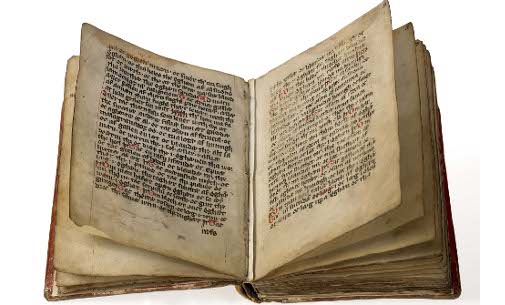
AM 188 8vo. Miscellany with medical advice from the 1500s
AM 188 8vo is a so-called miscellany from the first half of the 16th century. The last pages of the manuscript contain medical advice for humans and animals in Danish, Low German and Latin. Click on the picture to turn the pages in the manuscript AM 18 8vo or see pictures of its restoration.

